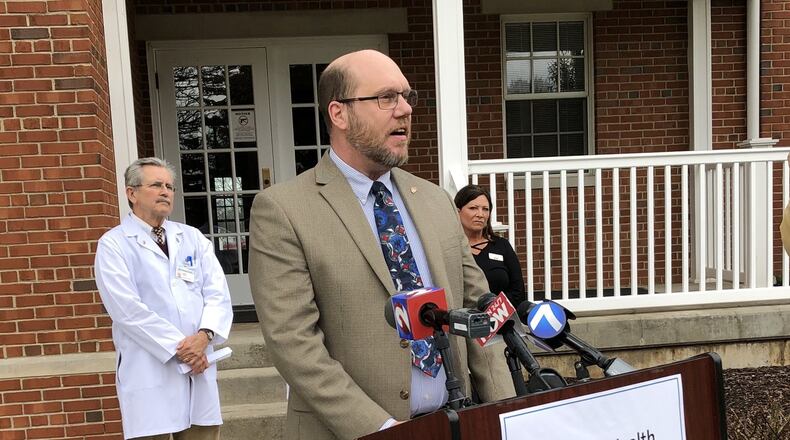“I don’t necessarily think we will have higher costs than surrounding counties because of our higher numbers,” said Joel Smith, Miami County Emergency Management Agency director.
“Miami County numbers are driven by the outbreak in two long-term care facilities. Those facilities bear their own costs. Non-profit hospitals are considered to be providing essential services to protect life and are therefore eligible on their own to apply for FEMA public assistance.”
The majority of cases in the county are linked to an outbreak affecting patients and staff at two nursing homes — Koester Pavilion in Troy and SpringMeade Health Center in Tipp City. The age range of the positive cases in the county is less than 1 year to 96, with 70 females and 51 males, the health department said.
RELATED: Coronavirus in Ohio nursing homes: ‘We are going to see deaths’
Smith said businesses and residents living under restrictive conditions “have ‘flattened the curve’ to the extent that our local resources won’t be completely overwhelmed.”
Resources, such as personal protective equipment, are a challenge, Smith said, adding, “But we will cope because of great regional cooperation, and a great outpouring of support in the form of donations of PPE from educational facilities, businesses, veterans and dentists’ offices and private citizens.”
Miami County Public Health has worked with EMA on sourcing needed materials including PPE, said Nate Bednar, Public Health emergency preparedness coordinator.
Public health incident management team members have been working seven days a week, Bednar said. “We have begun to implement schedules and policies that allow for time off and ensure the staff is not becoming fatigued,” he said.
Coronavirus: Miami County has 21 deaths
Public Health has been able to work within its budget but is seeking added funding from the Ohio Department of Health for continued response operations. Assistance in materials and staffing also has been provided by regional health department partners, Bednar said.
The public’s compliance with social distancing and stay at home orders is helping, he said. “For the most part everyone in the county has been doing a great job of social distancing and flattening the curve,” he said. A department team is checking social distancing and essential/non-essential businesses complaints and responding as needed. So far, less than a half dozen businesses have been asked to cease operations.
The Miami County commissioners this week will discuss finances and options in light of COVID-19, said county Commission President Jack Evans.
The commissioners closed county offices last month except for courts and business by appointment.
DETAILS: Nearly 800 new local layoffs made public by the state so far today
The number of COVID-19 cases in the community doesn’t directly impact county government finances although closures and job losses will impact county sales tax income, he said. “We feel really badly for the folks (affected by the virus),” Evans said.
Miami County is fortunate to be in a good financial position with reserves but will need to look at spending, Evans said. Commissioners already halted spending for travel and training and asked departments to avoid nonessential training.
The commissioners have not received any requests for additional funding, Leigh Williams, the commissioners’ clerk/administrator, said. County Coroner Dr. William Ginn notified commissioners that if autopsies continue at the current rate, more funding will be needed later in the year. Autopsies, however, are not being done with COVID-19 deaths.
As in many areas, foundations have started support funds for nonprofit organizations while the Troy Area Chamber of Commerce and partners initiated a fund to support local small businesses.
The Miami County Continuum of Care, an organization of nonprofits, is holding weekly teleconferences to talk about needs and concerns with the coronavirus.
“I am not sure that the fact Miami County is a hot spot (for COVID-19) has played much into people’s thinking, at least at first,” said Bill Lutz, of the New Path in Tipp City and Continuum of Care planning committee member. “Most people that I have talked to have a good understanding that at least the outbreak was contained to the two long term care facilities. It hasn’t been until the last week, though, that we seem to hear more anecdotal stories of people we know that have the disease. It seems to be hitting closer to home now.”
Lutz said he knows a lot of people who have been laid off/furloughed or have taken steep pay cuts. As the third week of shutdown was coming to an end, the number of people coming to the New Path food pantry was starting to increase, he said.
“We are going to get busier. There is no doubt about it,” Lutz said.
About the Author
